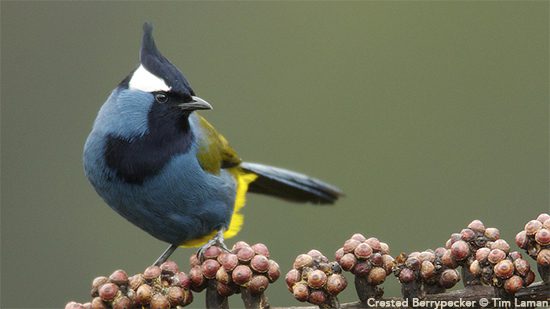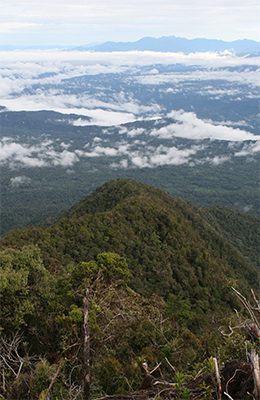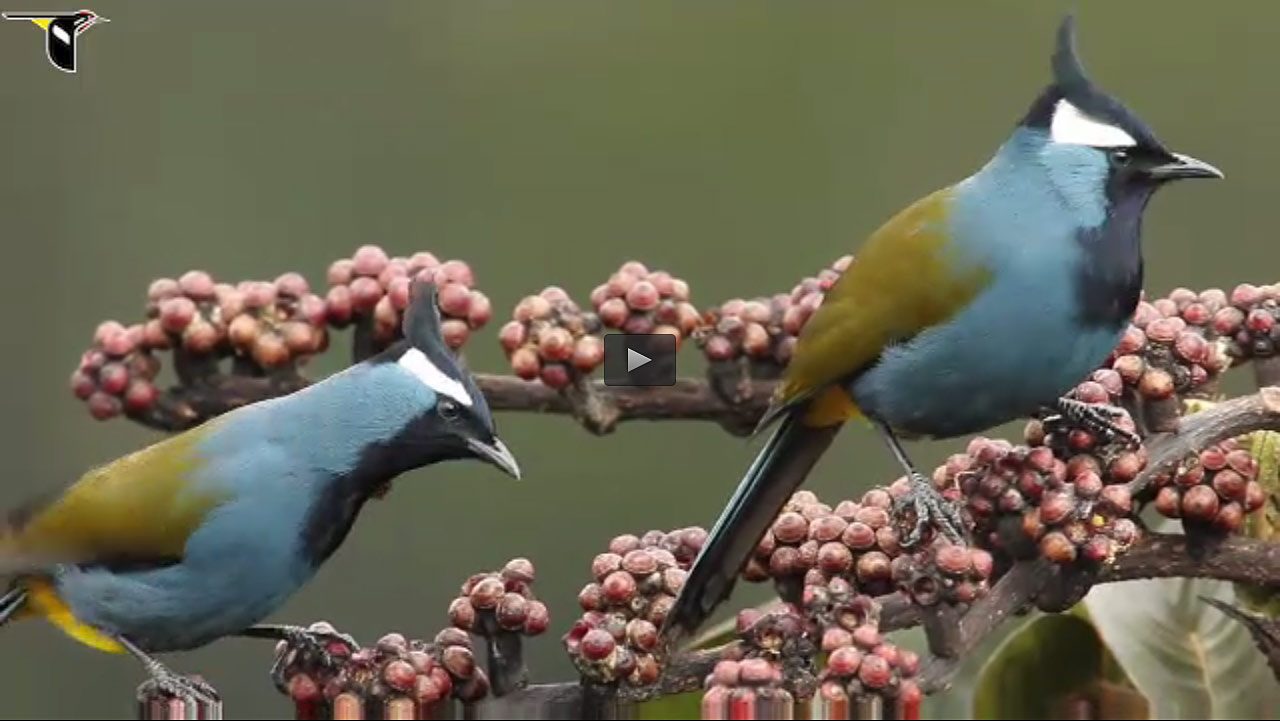Climate Change Pushing Tropical Birds Up the Mountain…and Off
February 18, 2014
Many tropical mountain birds are shifting their ranges upslope to escape warming temperatures that disrupt their way of life, according to research by a husband-and-wife team from the Cornell Lab of Ornithology that retraced scientist Jared Diamond’s landmark New Guinea expedition in the 1960s. The study was published February 18 in the Proceedings of the National Academy of Sciences.
But there’s only so much room on these mountains. Climate change predictions suggest that before the end of this century, global warming will push at least four of these species into localized extinctions, says Benjamin Freeman, the study’s lead author and a Ph.D. student at Cornell University. Freeman conducted this research with his wife, Alexandra Class Freeman, a Ph.D. who works at the Cornell Lab of Ornithology.
“Our research demonstrates that no matter where you are on earth, even a tropical wilderness island in the South Pacific, climate change is happening and having tangible impacts,” says Class Freeman. “In this case, the activities of industrialized nations causing climate change are impacting birds in remote New Guinea, deep in tropical mountain forests, causing them to move up the slopes to find their preferred habitat.”
The new study extends existing research by showing that tropical species are more sensitive to climate shifts than species from temperate regions. Many birds, such as the Northern Cardinal in the United States, have moved farther north over the past 50 years. Birds that live on mountains are also shifting their ranges, in their case moving up in elevation to escape warming temperatures below. The Freemans’ research showed that mountain birds in tropical climates are moving upslope even farther and faster than those in temperate climates—almost 400 feet (or as high as a 40-story skyscraper) over about the last 50 years.

“We always hear about polar bears being affected by large temperature changes in the Arctic, but many tropical birds are attuned to small microclimates, and so they are just as much affected by the smaller-scale change happening in tropical climates,” says Freeman. “And because a mountain is like a pyramid, there’s less area for habitat available as they move up the mountain. They’re being squeezed both by temperatures and for space.”
The research was conducted on two remote forested mountains in Papua New Guinea, one (Karkar Island) hosting an active volcano and the other (Mt. Karimui) a dormant one. The Freemans followed up on Diamond’s pioneering bird surveys of these mountains 50 years ago, which offered a baseline for measuring change. The annual mean temperature on these islands has risen about 0.7 degree Fahrenheit in the past five decades. The birds’ movement up the mountains closely matched the temperature increase. On Mt. Karimui, 87 bird species (or 70 percent of all species in the survey) responded by shifting their ranges up the mountain by an average of 370 feet. On Karkar Island, which is a smaller oceanic island with fewer birds and less diversity, a greater proportion of birds (17 species, or 77 percent of all species in the survey) moved upslope by an even greater amount—an average of 500 feet. The mountains in the research are about 8,000 feet tall.
Because these mountains are so remote, there has been minimal human development. Climate change is the only major environmental change that has occurred since Diamond’s historical transects.

Four bird species in the study—the White-winged Robin, Mountain Gerygone, Crested Satinbird, and Crested Berrypecker—have already shifted their ranges up near the summit of Mt. Karimui. A further 1.8 degrees Fahrenheit increase will likely result in the localized extinction of all four of these species, say the authors. Temperatures in New Guinea are predicted to increase by 4.5 degrees Fahrenheit by the end of this century.
“The predicted change by the year 2100 will not only finish off four species on these mountains, but another 10 to 15 species will be put in very precarious positions,” says Freeman. “Furthermore, these upslope shifts are not only happening on the two New Guinean mountains we studied. They’re happening with Peruvian birds, Indonesian moths, Madagascar chameleons, and probably the majority of species in tropical mountains.”
While the species affected on Mt. Karimui and Karkar Island will persist on other islands with taller mountains in New Guinea in the short term, the broader trend is clear—continued temperature increases will cause extinctions of tropical birds on mountains.
This research presents strong evidence of the need for tropical mountain habitat conservation, say the authors, who point out that intact and connected contiguous forests up a mountainside provide the best conductivity for bird species moving upslope.
“As climate change continues and even increases, we know several bird species will be looking for habitat corridors and forested places for new homes at the upper elevations of tropical mountains. Agriculture and development present barriers to the movement of these birds. So we need to make sure the habitat is in place to allow birds to adapt,” says Freeman.
“The biggest problem, of course, is global climate change,” says Class Freeman. “We can’t build more mountains and more high-elevation tropical forests, so the best thing we can do to help these birds is tackle climate change.”
The abstract of the paper is available from the journal website. You can see more videos of New Guinea highland birds in a special collection from our Macaulay Library. This research was funded by the National Science Foundation, the Athena Fund of the Cornell Lab of Ornithology, and the Explorer’s Fund.

All About Birds
is a free resource
Available for everyone,
funded by donors like you
American Kestrel by Blair Dudeck / Macaulay Library
